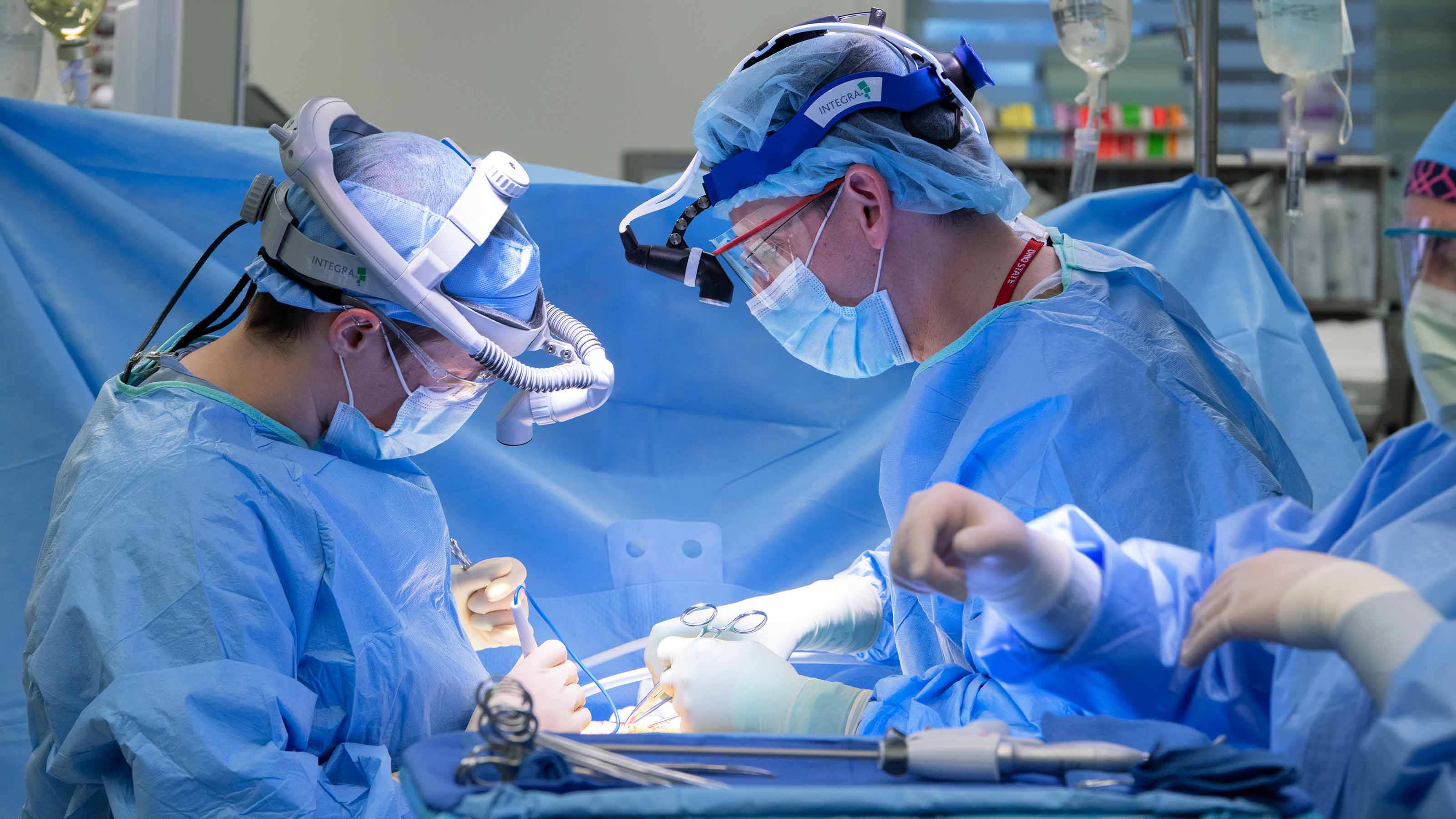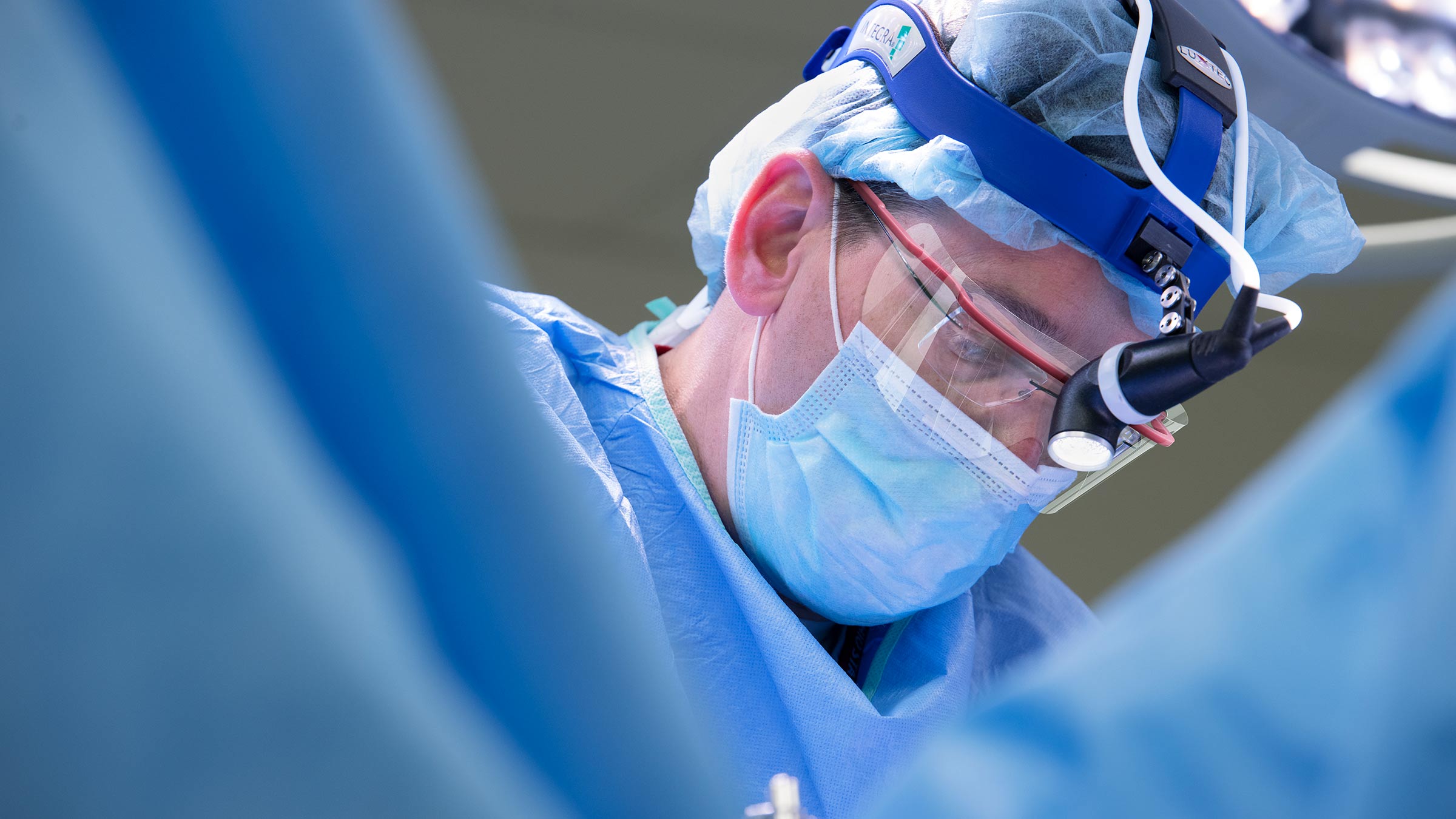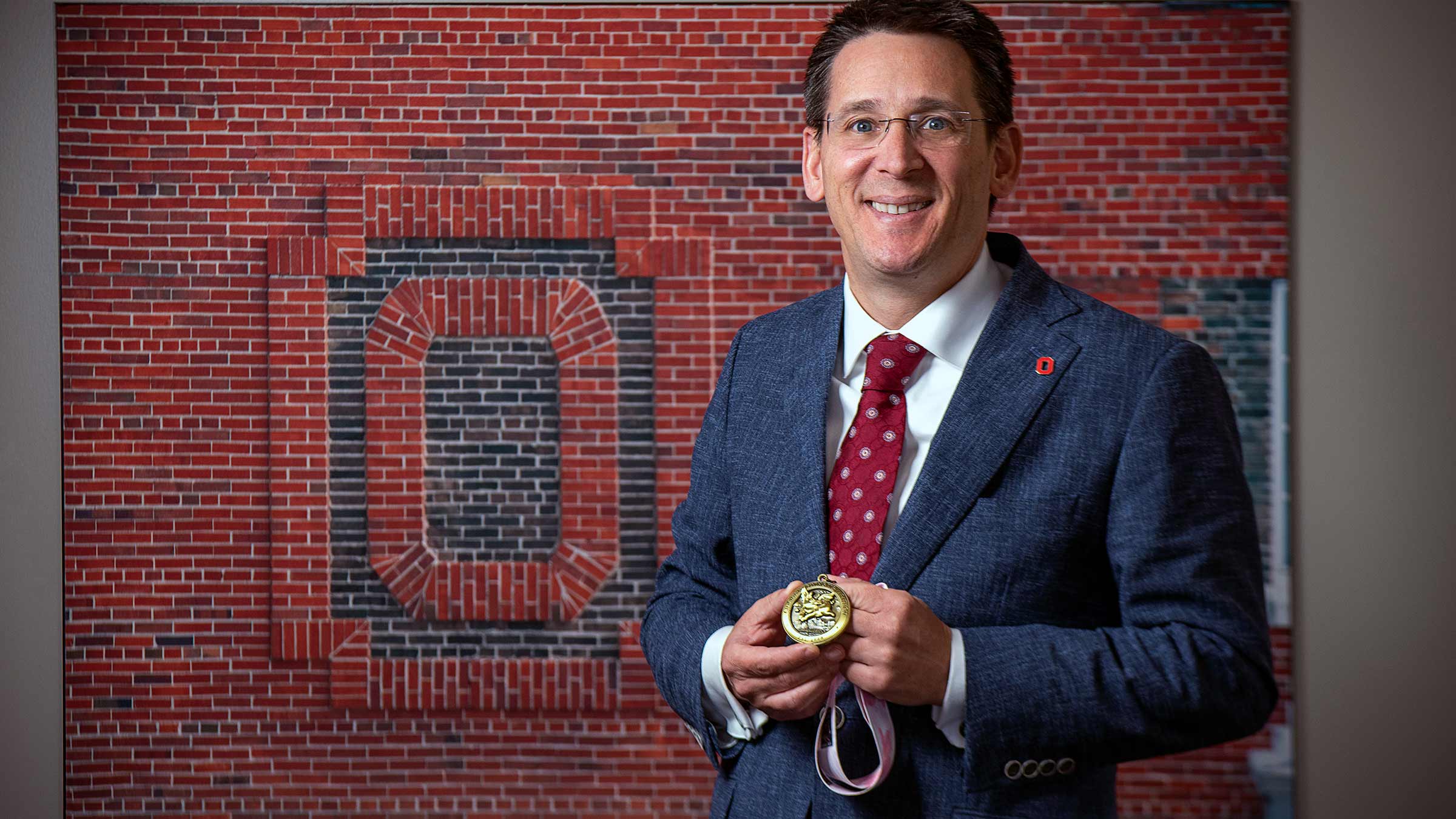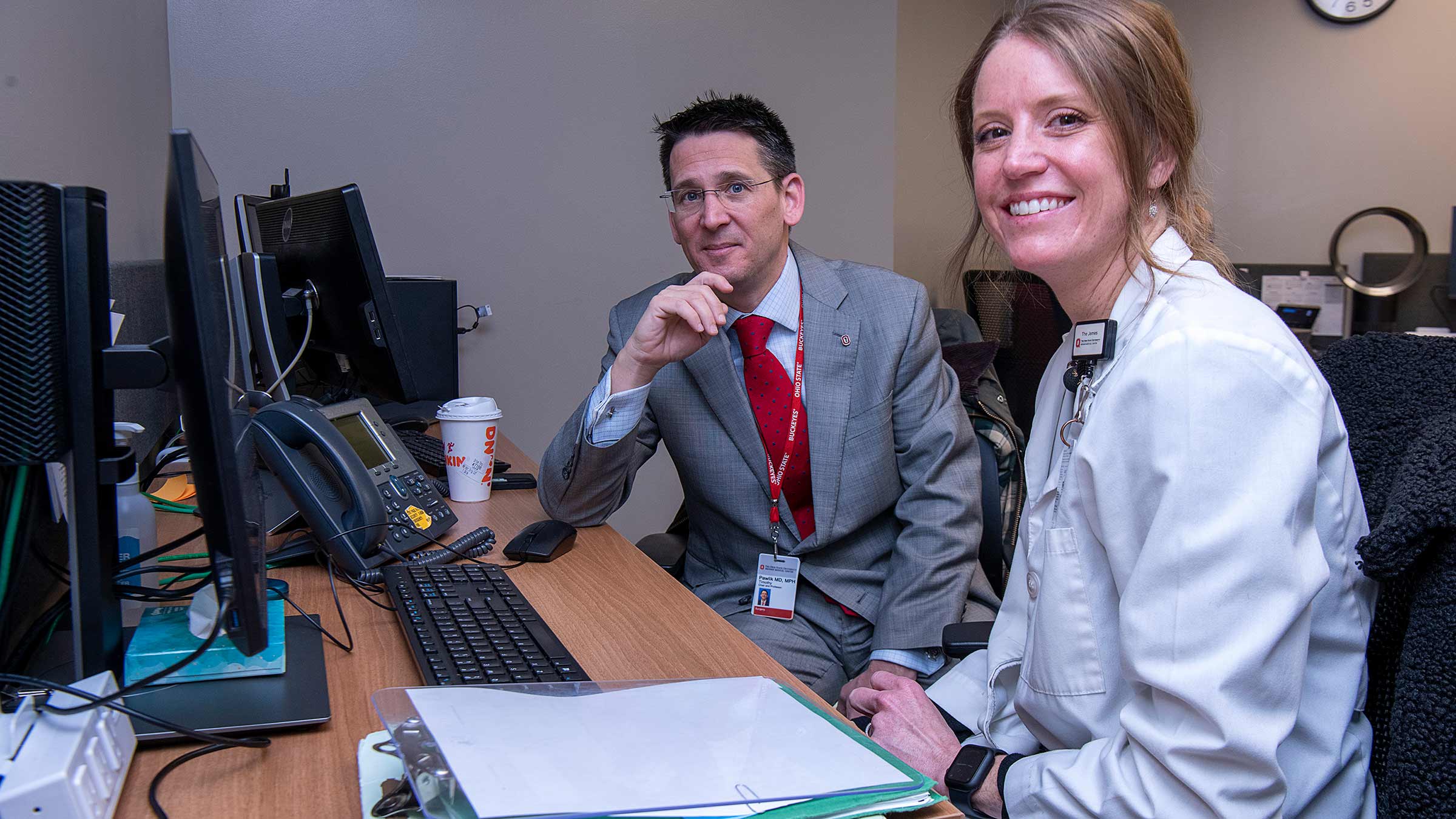Lifelong learning drives surgeon to change the odds for liver and pancreatic cancer patients
Rooted in hard work and humble beginnings, Timothy Pawlik, MD, PhD, MPH, considers being an academic surgeon ‘a gift.’
In the small, gray-walled room, Roger and Cathy McNamer wait. They’ve driven a little over two hours this morning from the calm of country roads through city traffic for yet another doctor’s appointment.
After Timothy Pawlik, MD, PhD, MPH, introduces himself, Cathy McNamer reaches into her purse for the hand-held recorder their son in Florida bought and mailed. All four of their children have questions.
“Have you seen your scans?” Dr. Pawlik asks. “You’re going to become an expert.”
Pulling up the images on the computer screen, he explains the angles. “Imagine you’re a loaf of bread and every image on the screen is a slice of the loaf. This is your chest.”
At first, that’s where Roger McNamer thought the problem was. Other than occasional sharp chest pains, he had felt fine. Then a scan showed he had a quickly growing tumor in his lungs. About a week later, another scan revealed a type of liver cancer as well. Two different cancers in two major organs growing at the same time.
Dr. Pawlik scrolls down. “See that. That’s it.” He points to the edge of the liver. “That’s not supposed to be there. That’s what we’re dealing with.”
“Why it developed, it’s hard to know,” he says of the tumor.
He neither smokes nor drinks, McNamer tells Dr. Pawlik. It may be his weight, Dr. Pawlik says. Excess fat can get stored in the liver, and sometimes that can lead to cancer in the organ responsible for purifying the body’s blood, he says.
A surgeon at The Ohio State University Comprehensive Cancer Center – Arthur G. James Cancer Hospital and Richard J. Solove Research Institute (OSUCCC – James), Dr. Pawlik specializes in removing cancer from the liver, bile duct and pancreas, among the toughest cancers to overcome. He explains he can operate to remove the liver tumor. However, he can’t do that until after McNamer finishes chemotherapy for the lung cancer. So, for now, it’s a bit of a waiting game — not a typical step when dealing with cancer.
Dr. Pawlik knows he’s just unloaded a lot. He asks if the couple, both retired teachers from Portsmouth, a small town along the Ohio River, have questions.
Does the liver still work when a piece of it’s removed, Cathy McNamer wants to know.
Remove a section of the liver and the remainder will grow in response, he explains.
“You know how when a starfish loses an arm, another arm will grow. With the liver, the other arms will just get bigger,” Dr. Pawlik says.
In the sometimes confusing, often overwhelming process of understanding the why and how of cancer, an analogy, Dr. Pawlik has learned, can help someone make sense of it all: a scan, a diagnosis, a procedure and the risks that come with it. Patients want to hear: The cancer will be gone. For good. But any doctor who deals with cancer knows that sometimes, the most they can offer is a few more birthdays, wedding anniversaries, a chance to walk a son or daughter down the aisle.

A surgeon for nearly three decades, Dr. Pawlik chairs the Department of Surgery at The Ohio State University Wexner Medical Center where he holds the Urban Meyer III and Shelley Meyer Chair for Cancer Research in the College of Medicine, which supports studies of all types of cancer. All of Dr. Pawlik’s roles — surgeon, mentor, leader — play to his strengths: meeting and connecting with people, advising, setting a strategy and constantly striving for another challenge.
With his youthful looks and seemingly inexhaustible energy — he insists he really does sleep — Dr. Pawlik could easily be mistaken for being as much as a couple of decades younger than his age (he’s in his early 50s). Intense and strongly extroverted, he thrives on building a diverse team and keeping enthusiasm on the surgical staff, particularly through the pandemic’s many unpredicted hurdles.
His yearning to have impact has fueled the course of a medical career that has some not-so-typical accomplishments including a master’s degree in theology, and research on the effect of spirituality on patients confronting potentially fatal diseases.
Dr. Pawlik is ranked number one in the world as an expert in hepatectomy, the removal of all or part of the liver, and number two in the world as an expert in bile duct cancer, also known as cholangiocarcinoma, according to Expertscape, which ranks professionals based on scientific publications.
Answers to your questions about liver and bile duct cancer
His tenacity was sparked early on, the elder son of a mechanic and his wife, both of whom were adamant their four children would have the chance to go to college. He was raised in Lawrence, Massachusetts, an industrial city north of Boston. There, his father poured himself into the family’s used car business, working long days and weekends fixing and selling cars. His life was the business. All the while, his son never had the slightest interest in cars. And that was fine with his parents, who discouraged him from aspiring to work in the family business his grandfather had started. Instead, they wanted him to become a lawyer or a doctor; his mom had hoped for a priest.
A perfectionist by nature, his mother pushed for him to do well in school. If he got a 98% on a test, she’d ask: why not 100%?
Dr. Pawlik inherited his mother’s perfectionism and his father’s strong work ethic, and both served him well in medical school, then later in the operating room. Like his father, who repaired motors, brakes and transmissions, Dr. Pawlik liked working with his hands, going in to find and, in a matter of hours, fix a problem.
He was immediately drawn to cancer. Many on Dr. Pawlik’s father’s side of the family — uncles, aunts, cousins — died of cancer, all of them before the age of 65. A decade ago when his sister was diagnosed with breast cancer, she found out she had a gene that predisposed her to certain types of cancer, a gene the family would later learn that his father and brother have as well.
An uncommon move
While a research fellow at Massachusetts General Hospital, Dr. Pawlik made an unusual move for a young physician. He decided to earn a master’s degree in theology from Harvard Divinity School. Theology had long captivated him, having majored in it and biology as an undergraduate. Also, he was interested in bioethics and had considered going into transplant surgery.
He’d spend mornings in the lab doing research and running experiments. Afternoons and nights, he discussed spirituality and philosophy. He liked straddling the world of medicine, which values facts and empirical data, and the world of theology, which is based on what can’t be proven.
“A lot of surgeons at the time thought it was odd,” he says.
He already knew that the degree wasn’t going to translate to a better job or a better salary, and that it would cut into whatever free time he had, but he wanted to do it. Besides, Harvard Divinity School was just a few subway stops away from Massachusetts General. Seeing a chance to go after what he really loved, he took it.
That degree has shaped the lens through which he sees and treats cancer patients, many of whom grapple with the fear, angst and uncertainty that can come with a life-threatening illness. It has helped him look beyond the cancer he had been trained for years to exclusively focus on and recognize those other hurdles a patient may wrestle with. Questions about the meaning of suffering, the purpose of life.

Always seeking
In a constant chase of another challenge, Dr. Pawlik has earned several degrees. He received a master’s in public health while getting his medical degree. He added a doctorate in epidemiology while on faculty at Johns Hopkins University. Now at Ohio State, he just finished an Executive MBA.
“I like to think of it not as collecting degrees, but as collecting experiences and stretching myself,” he says. “Why do I need another degree? I don’t. I’m less interested in the degree. I’m more interested in the experience.”
Similar to his father, Dr. Pawlik has little separation between work and play. The way he figures it, work is play when you’re doing what you love.
In his work, Dr. Pawlik tackles some of the most challenging cancers. Patients with cancer in the liver or pancreas often have no symptoms, or have symptoms that hide by mimicking the symptoms of other, less deadly illnesses.
The liver cancer survival rate can be low. On average, people with liver cancer are 20% as likely to survive five years after they’re diagnosed compared to people who don’t have cancer. For pancreatic cancer, it’s 10%, according to the American Cancer Society.
“Sometimes people can anchor to a number and that’s not helpful for them,” Dr. Pawlik says. “I tell patients we’re going to work hard. We’re going to do all we can and hope for a good outcome.” At times, eliminating the cancer may not be possible, but someone’s life could be prolonged.
“It’s easier to talk in absolutes: ‘This is going to work. This is not going to work.’ It’s harder to be comfortable with the ambiguity that often is the reality of the situation.”
Roger McNamer knows that well. Before Dr. Pawlik operates on him to remove the liver cancer, McNamer will undergo a procedure to stop the blood flow into the tumor in his liver to stop it from growing. Then after finishing chemotherapy on the cancer in his lung, Dr. Pawlik will tackle the liver tumor.
For now, McNamer’s days alternate between radiation and chemotherapy with a few days of reprieve between them. His wait continues.
‘Wind beneath my wings’
Dr. Pawlik gets up from his desk and walks over to a cabinet. What inspires him in a profession that deals with so much tragedy is in this cabinet — pictures of family members and those of former patients, along with their letters and gifts, people who had, at one point, thought their lives might be cut short.
He picks up a medal. It’s from the Cincinnati Flying Pig Marathon, October 2020. It’s a “wind beneath my wings medal” former patient Wendy Vogel sent him.
He skims the note that came with the medal.
“I’m getting emotional actually,” he says. His face flushes, his voice cracks. You removed half my liver — he pauses, eyes welling up, and continues — and part of my diaphragm and I’m able to do this because of you. He lifts up the note and puts it back on his desk.
“You can see I’m a softie,” he says.
“These are real people struggling with real problems. Just to be able to help them, it’s powerful stuff. It’s like you’re touching someone’s life.”
The cancer that Vogel, a veterinarian, had in 2019 started in her colon and moved to her liver.
“I am 100% sure I would already be dead if not for the surgery Dr. Pawlik did,” she says. “I had stage 4 colon cancer. (Now) I am running half-marathons and working full-time and writing novels.”
When Dr. Pawlik went in to remove the cancer, he also discovered what X-rays hadn’t shown: that the cancer had also reached her diaphragm, the muscle that helps in breathing. Having cancer there made the surgery all the more risky. Dr. Pawlik had to open the chest area and remove the cancerous part of Vogel’s diaphragm.
“It really took courage. It would have been very easy for him to say, ‘Oh it’s in your diaphragm. It’s too risky,’ sewed me back up and sent me home,” says Vogel, 50. “The mark of a truly gifted surgeon is when everything doesn’t go as planned and you still go in and have success.”

Setting high standards
As an academic surgeon who has always worked for university medical centers, Dr. Pawlik thrives on the opportunity to inspire and guide young surgeons, offer them advice, contacts and, sometimes, a push to do their best.
Beginning in 2006 when he mentored Hari Nathan, then a surgical resident at Johns Hopkins University, Dr. Pawlik was always demanding but kind, supportive and thorough, says Dr. Nathan, a liver and pancreatic cancer surgeon and an associate professor at University of Michigan.
“He’s one of those people who makes you rise to the occasion and step up your game. He can give you a nudge if he thinks you need one,” Dr. Nathan says. “If you sign on to work with him, you have no choice but to be incredibly productive.”
And whatever high standard he sets for those he mentors, he sets for himself as well.
“He won’t ask you to do something he isn’t willing to do,” Dr. Nathan says. “If he asks you to turn something around, he’ll do the same for you. You’ll get an answer back. That night. He has very high expectations, but he also has very high expectations for himself.”
As chief of surgery for the Ohio State Wexner Medical Center, Dr. Pawlik works with hospital staff and department directors as well as physicians to oversee the surgical department at the Columbus campus and suburban outpatient sites. Under his leadership, the Department of Surgery has recruited over 65 new faculty members, is ranked sixth in funding from the National Institutes of Health and has a top 10 ranked surgical residency program, according to Doximity, a network of physicians nationwide.
Dr. Pawlik asks a lot of questions and easily builds rapport with people, says Raphael Pollock MD, PhD, a cancer surgeon and director of The Ohio State University Comprehensive Cancer Center.
“He has very good listening skills and hears what other people are saying and is able to synthesize a lot of opinions into a coherent whole and communicate that,” Dr. Pollock says.
And part of his talent as a leader is coming up with goals and a clear strategy.
“He has this ability to know which way events are flowing and how patterns of activity or behavior will most likely roll out,” Dr. Pollock says.

Collaborating around the world
Among Dr. Pawlik’s research contributions has been collaborating with surgeons and researchers nationwide on treating bile duct cancer, a rare cancer he specializes in, along with liver and pancreatic cancer. Bile duct cancer is so rare that a decade ago, no single institution had treated enough patients to collect sufficient data to guide care and provide treatment options for the disease.
Discovering that gap, Dr. Pawlik pooled data from researchers and doctors around the world so everyone could know how to best treat bile duct cancer. Together with his research team, he helped establish the system of bile cancer stages now used around the world to designate how advanced the cancer is.
His research has put Dr. Pawlik in contact with colleagues across the country and around the world. Those relationships, those opportunities to meet so many people, are part of what he considers “the gift” of being an academic surgeon. It has also led to Dr. Pawlik being made an honorary member of surgical societies around the world from Australia to Portugal to Brazil.
Whomever he’s with, wherever he goes, Dr. Pawlik likes to capture the moment on Twitter. He’s often the one with one arm raised at the edge of the photo, the one taking the shot. He tweets when he’s in a huddle at a conference, when he wants to acknowledge a colleague’s most recent accomplishment, when he hosts a ping-pong championship for resident surgeons at his house and loses.
Through all of his commitments and accomplishments, his wife, Megan, and four children ranging in age from 12 to 20, keep him grounded.
“Having a big family, I realize everyone has their own priorities and needs, and I'm not the center of the universe,” he says.
His brother, who now runs the family used car business, will be quick to remind him, in jest, that Pawlik may be able to remove cancer from a liver or pancreas, but he still can’t rebuild a motor.





